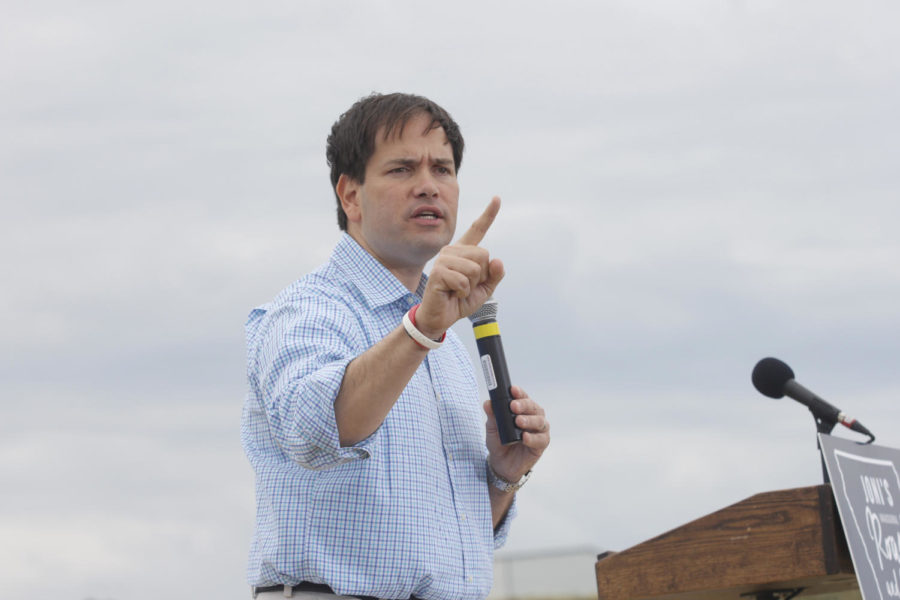Marco Rubio runs slow, steady campaign for GOP nod
September 28, 2015
He isn’t making headlines. He isn’t leading any polls.
While other Republican candidates went after each other in the second Republican debate, Marco Rubio has been quietly racking up donors and support at small-event fundraisers and avoiding the harsh scrutiny of the political spotlight.
“I think the Rubio campaign is exactly where he wants it to be — slow and steady,” said state Sen. Rick Bertrand, R-Sioux City, who is chair of Rubio’s campaign in Iowa’s 4th Congressional District. “It’s about building your message and building your policies.”
Rubio’s slow and steady approach has translated into slow and steady success in the polls. Nationally, several polls released after the second debate show Rubio at about 10 percent support. While he’s behind several candidates, his numbers have not fluctuated much recently.
In his home state of Florida, he has pulled ahead of former Gov. Jeb Bush into second place behind frontrunner Donald Trump, according to a poll by Florida Atlantic University after the debate.
But that doesn’t interest Rubio. His campaign has often down played success in the polls, with his modest gains still well behind Trump.
“Sen. Rubio has made it clear that he doesn’t chase polls,” Bertrand said.
Instead of chasing polls, Rubio has been out scooping up supporters of Wisconsin Gov. Scott Walker after he dropped out of the race. Rubio’s campaign has added key supporters from Walker’s campaign in early voting sates such as Iowa, New Hampshire and South Carolina.
Picking up supporters as other candidates begin to drop from the race could prove vital to Rubio’s campaign once the field starts to narrow. He is often touted as people’s second or third choice in polls, and a late push from these new supporters could be pivotal in the looming Iowa Caucus.
“Marco has always been my second choice.” said Brittany Gaura, junior in political science. “He is himself. He tells it like it is.”
Gaura, a Wisconsin native, has been a big supporter of Walker since 2010. She led “Students for Walker” in Iowa before the governor dropped out of the race last week, but quickly jumped ship to Rubio.
Clayton Sampson, junior at the University of Iowa, campaigned for Walker and is now supporting Rubio’s campaign.
“I like how he has a realistic approach,” Sampson said. “Instead of an over-optimistic, politician’s approach.”
While campaigning, Rubio often talks about just recently paying off his student loans in order to show that he’s “one of us,” and also tells the story of his parents who were immigrants who came to America to be successful.
“He’s a working guy who comes from working people,” Bertrand said. “I think he’s got a good grasp of what’s really going on in America.”
Although he might appeal to many Republicans as a fresh face and a hard-working conservative, Rubio has faced criticism from Democrats and even some in his own party. Many point to him missing votes in the Senate to campaign for president throughout this year.
Rubio was part of a bipartisan immigration plan in 2013 that offered a path to citizenship for 11 million undocumented immigrants. The measure passed in the Senate and then stalled in the House, at which point Rubio gave up on the measure, calling it a “mistake.”
Supporters of the deal have said he folded too easily, and Trump has criticized him for backing such a deal in the first place. Others have called him out for his flip-flop on the issue.
“He needs to find a niche, to make a splash,” said Mack Shelley, professor of political science. “He has to latch onto something and know his policies to keep up with Trump’s charisma.”
The current GOP race has shown that charisma and political experience put together does not necessarily translate to support. The current top three in the Republican national polls — Trump, neurosurgeon Ben Carson and former HP CEO Carly Fiorina — are not politicians, while the only casualties thus far in the GOP race are governors who were widely considered successful in implementing conservative policies.
Marco Rubio’s under-the-radar campaign strategy has started to pay some early dividends.
“It’s early, but Rubio is right where he wants to be,” Gaura said. “Not too far ahead, not too far behind.”
Sampson said President Obama did the same thing in 2008
“He was just a junior senator from Illinois. Rubio is just a junior senator from Florida,” Sampson said.







